Only the End of the World again: Jericho vs. Revolution
Do Americans have a (sub)conscious desire to eliminate their society? This is a question you could ask yourself when you look at the vast amount of dystopian and apocalyptic fiction out there, seemingly all of which seems to take place on the North American Continent. The Walking Dead, I Am Legend and Falling Skies depict the US as overrun by zombies/vampires/aliens, The Handmaid’s Tale depicts a totalitarian theocracy, Jericho shows us the immediate aftermath of nuclear annihilation and Revolution shows us a world without electricity. [This is probably a good time to warn you about the massive spoilers in this blog post for all of the above.]
The unimportance of monsters
I’m a connoisseur of all things science fiction, and apocalyptic visions of the future are an interesting means to envision a possible future as well as shed light on the present. (Smartass remark: the genre generally called “post-apocalyptic” when it should just be “apocalyptic”, because the term apocalypse itself means “an end AND a new beginning”). While I do watch The Walking Dead, I find the show somewhat overrated. It is set in the southern states of the former US, which has been overrun by zombies. Hardly anyone survives, and the few who survive fight amongst themselves for territory and pride. The zombies are clearly just a plot device to tell a story about human interaction in an apocalyptic setting, but they’re also a huge distraction from what’s really important – and they’re guaranteed to disrupt the flow of every episode. A somewhat similar case is Falling Skies, in which earth was overrun by aliens instead of zombies, and humans are wandering about trying to find someplace safe. I have stopped watching this show after the first season because I found it boring and lacking in interesting storytelling.

If monsters are involved, one story surpasses them all – and probably inspired them. This is Richard Matheson’s novel I Am Legend. [Please forget about the movie and read the book]. The novel was published in 1954, still in the wake of the events of World War II. In it, the world is overrun by vampires and only one human survives – as he was involved with the virus that caused the vampire apocalypse before it happened, therfore he is immune to the virus. As a result he is the only one of his kind – and the stakes are turned: he is now the monster in a society of vampires.
But interesting stories don’t need monsters – humans are capable of much worse monstrosities. Two brilliant cases demonstrate this: the TV shows Jericho and Revolution. Both take place in the (former) US, which in both stories undergoes a transformation. The difference is that Jericho gives us an account during and right after a catastrophe, while Revolution takes place 15 years later.
Revolution: 15 years without power
In Revolution, all electricity in the world has been switched off in a single day. In the 15 years that follow, people have adapted to this – supposedly after several big conflicts. Without supra-regional communication, the US is now divided into smaller state-nation-things, such as the Georgia Federation, the Plains Nation, Texas, the California Commonwealth and most prominently in the show, the Monroe Republic. The Monroe Republic is led by emo dictator Sebastian Monroe, to whom the main characters have a somewhat close relationship. At the center of this is Miles Matheson, a former general of Monroe who at one point deserted him. As a result, they constantly try to kill each other but just can’t seem to pull the trigger. Miles initially tries to lead a quiet life up until his niece Charlie shows up and demands his help. Reluctantly they venture out to find -erm- oh yes, it was that entirely forgettable brother of Charlie who was kidnapped by Monroe’s men. Once they found him, he obviously fulfilled his purpose as a plot device and was killed, and eventually the group -now also including Charlie’s mom Rachel, who apparently had an affair with Miles- goes on a quest to turn the power back on.
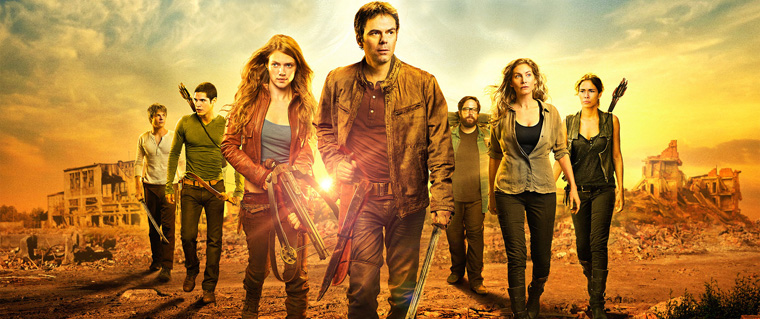
Revolution definitely has its problems in terms of character and plot development. A lot of the characters are very underdeveloped; Charlie oftentimes feels like the third wheel on the wagon, Miles is subject to limited acting abilities and both Rachel and Aaron suffer from puzzling, illogical decision-making. There are some undertones of soap opera in this show. Miles loves both Rachel and the rebel Nora, but I think Monroe would appreciate his love much more – it gets quite steamy (dialogue-wise) in this previously mentioned hot bromance between Miles and Monroe. 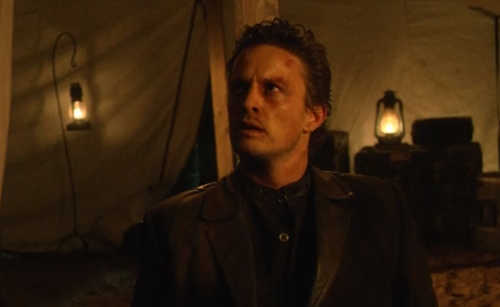 Monroe is a bastard, but unlike most characters, a well acted one – David Lyons does a good job at making him drip with brooding, whiny malice. While you might even feel sympathy for Monroe on occasion, Giancarlo Esposito even surpasses him – he portrays the downright evil Major Tom Neville, a character you wish would finally die every single episode.
Monroe is a bastard, but unlike most characters, a well acted one – David Lyons does a good job at making him drip with brooding, whiny malice. While you might even feel sympathy for Monroe on occasion, Giancarlo Esposito even surpasses him – he portrays the downright evil Major Tom Neville, a character you wish would finally die every single episode.
Revolution is full of plot holes and takes some strange sci-fi / fantasy liberties which make the entire show less realistic. The power was turned off due to tiny, tiny robots in the air, even in the blood of people, which suck all the power up. I’m not quite sure what to think of that, it seems like a plot device only half thought through. But it brings even bigger problems with it: if all the power is stopped at once, shouldn’t all the nuclear power plants in the world blow up?! This would lead to a massive fallout scenario. Also, in the season finale the power is turned back on, lights are lighting up again everywhere – but how? I presume all the power plants were shut down 15 years ago, so where does the power come from?! I don’t think the writers of Revolution considered any of this. This is me: attacking screenwriters with my logic.
Jericho: Bombed into the middle ages
Jericho is in all regards superior to Revolution. In Jericho, we experience a nuclear attack on the US and its aftermath. The show is set in a small, insular town in Kansas named Jericho, advantageously located far away from major cities, surrounded by plenty of farmland. After a long absence, lead character Jake Green returns to his hometown of Jericho. He didn’t leave his family on good terms, nevertheless they are relieved to see him again, alive and well. Just as his short visit ends and he is driving out of town again, he, as well as all the other characters, sees a mushroom cloud in the sky over what is presumably Denver. Communication breaks down completely – Jake has an accident on the road, but ultimately returns to Jericho and lives with his family. His family, the head of which is town mayor Johnston Green, and the citizens of Jericho face an uncertain future together. They tackle problems such as fallout rain, food shortages, surviving the winter without heating and panic in the population.
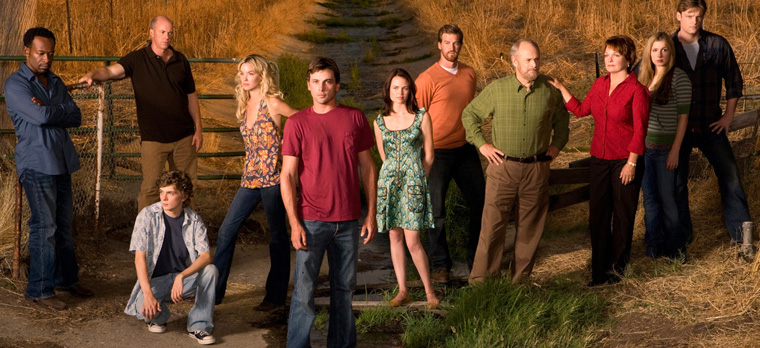
Jericho is interesting because it perfectly depicts the aftermath of an apocalyptic scenario without the distraction of plot holes or supernatural beings. Jericho is entirely about human interaction. Throughout the first season, the town of Jericho remains cut off from the world – 23 major cities of the US were destroyed, additionally there was EMP damage to the remaining towns. This puts Jericho into a medieval position – if you want information, you’d have to sent out a messenger on foot. That, of course, is dangerous, as gangs and criminals have established territories out in the uninhabited areas. (The situation is similar in Revolution, but never portrayed in an interesting fashion).
Jericho is a case study of how modern day people would handle a life in the middle ages. In addition, many subplots show medieval characteristics; a prominent example of this is the notion of exile. During the first season, a character, who is not originally from Jericho but fiancee to a Jericho-native, commits an unforgivable crime. He would not survive staying in Jericho, because people would seek revenge sooner or later. So he is sent into exile – he has to leave town and can never return. Just as in the middle ages, exile from Jericho is a death sentence. He has nowhere to go, other towns are suspicious of strangers, and the gangs out in the wild don’t hesitate to kill for loot. People are very focused on protecting their own – family as well as fellow townspeople of Jericho. Families will go as far as killing for revenge. One case, in which Jake’s brother Eric wants to avenge the death of their father, was very reminiscent of a medieval blood feud – Eric demands an equal compensation for the death of his father, which in this case would be the death of the person who is ultimately responsible for the attack, the sheriff of a neighboring town. It’s ironic that an American town is a stand-in for medieval circumstances, since as we all know America never experienced the actual middle ages.
All fiction that involves the US should be analyzed towards its religious connotations because the US was built by religious nutcases, the puritans. Sadly enough, their echoes are still omnipresent in the modern-day US. Therefore, I presume that the naming of the town of Jericho, Kansas is no coincidence. There is no real Jericho in Kansas, but in the bible, Jericho is famous for being a town that was besieged for seven days. The attackers blew their horns and the walls of Jericho fell – the city was overrun and completely destroyed, down to the last woman and child. It’s not actually that extreme in Jericho, though it does foreshadow some of the events in the series. The fictional Jericho often has problems defending itself from hostile parties. Eventually, in the second season it is overrun, and there is no option to get rid of the besiegers.
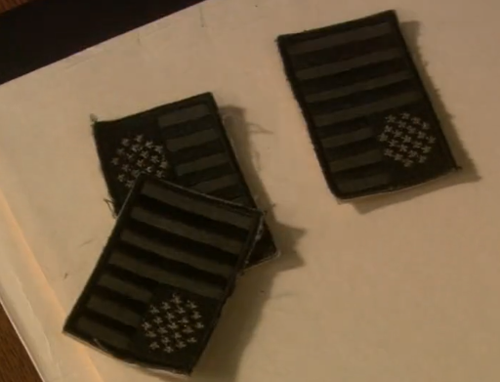 The second season of Jericho slightly shifts the focus of the series. It is revealed that efforts to rebuild the US are underway. Originally, six different cities claimed to be the new capital. Several of them unite under Cheyenne, Wyoming, while another few united under Columbus, Ohio. Texas, as usual, remains independent. Cheyenne appears to be the strongest, and the new government there is highly bureaucratic. Cheyenne sends help to Jericho, but in turn puts up a lot of administrative barriers. The town is now crawling with soldiers, a curse disguised as a blessing, as we later learn. While season 2 also provides us with plenty of material to think about and analyze, there are a few things that bug me: most importantly, the “season 1 amnesia” regarding the fallout. What happened to the EMP damage? Electricity seems to work without a problem again. I vaguely remember that EMP damage is not THAT easy to get rid of. Also, what happened to the radiation? Due to the newly gained mobility with help of the army, people can move around more freely again. I just wonder how they do that without getting radiation poisoning, because as far as I remember, nuclear contamination lasts for a few million years. Also, why is production, for example that of the tiny flags on the army uniforms, up and running again so quickly?! Despite these minor flaws, season two was yet another interesting case study and it’s a shame that the show was cancelled after only 7 episodes in season two (I blame Jake’s terrible hairstyle for this). In addition to that, the last three episodes appear to have undergone massive budget cuts – they look worse than any given soap opera. That is a slap in the face to any true fan who fought for the return of the show after it was originally cancelled after season one. What. The. Fuck.
The second season of Jericho slightly shifts the focus of the series. It is revealed that efforts to rebuild the US are underway. Originally, six different cities claimed to be the new capital. Several of them unite under Cheyenne, Wyoming, while another few united under Columbus, Ohio. Texas, as usual, remains independent. Cheyenne appears to be the strongest, and the new government there is highly bureaucratic. Cheyenne sends help to Jericho, but in turn puts up a lot of administrative barriers. The town is now crawling with soldiers, a curse disguised as a blessing, as we later learn. While season 2 also provides us with plenty of material to think about and analyze, there are a few things that bug me: most importantly, the “season 1 amnesia” regarding the fallout. What happened to the EMP damage? Electricity seems to work without a problem again. I vaguely remember that EMP damage is not THAT easy to get rid of. Also, what happened to the radiation? Due to the newly gained mobility with help of the army, people can move around more freely again. I just wonder how they do that without getting radiation poisoning, because as far as I remember, nuclear contamination lasts for a few million years. Also, why is production, for example that of the tiny flags on the army uniforms, up and running again so quickly?! Despite these minor flaws, season two was yet another interesting case study and it’s a shame that the show was cancelled after only 7 episodes in season two (I blame Jake’s terrible hairstyle for this). In addition to that, the last three episodes appear to have undergone massive budget cuts – they look worse than any given soap opera. That is a slap in the face to any true fan who fought for the return of the show after it was originally cancelled after season one. What. The. Fuck.
Despite its small disappointments, season two of Jericho establishes a whole new world. It is finally confirmed that the bombings were the work of American extremists, and not the result of international tensions. Those Americans wanted to create a clean slate in order to establish a new government which is basically ruled by a corporation. But the head of the secret organization who organized the attacks had a different agenda: he wanted to get rid of the organization, and in order to do that, he way playing the long game. After a new government was established in Cheyenne, he attempted a final nuclear strike on Cheyenne to completely wipe out said organization.
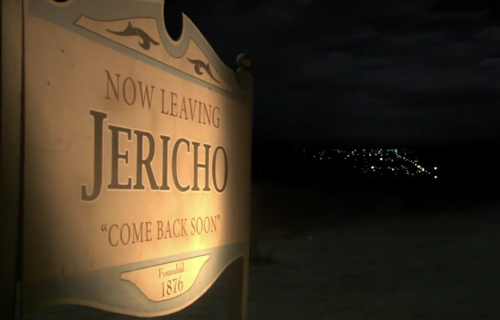 Season two of Jericho is trying to teach us that corporations have power over us – way too much power. The corporation in the new government controls everything and goes as far as confiscating any goods that are not authorized (or rather produced) by said corporation – even something as life-saving as a vaccine. Though the people of Jericho are tightly in the reins of said corporation, they are, of course clever and innovative enough to tackle such problems. If inspecting this from a real-life perspective, we seem not as clever as the people of Jericho: our lives are completely controlled by corporations and there is nothing we can do about it. Big companies such as Facebook and Apple basically own us. Since their reins are of a digital nature, we can’t counteract hands-on. We just have to click “Agree” to the Terms of Service and hope for the best, whereas not agreeing would probably result in social isolation. An even worse nightmare is the recently introduced Xbox One, which I very much hope will be a huge flop.
Season two of Jericho is trying to teach us that corporations have power over us – way too much power. The corporation in the new government controls everything and goes as far as confiscating any goods that are not authorized (or rather produced) by said corporation – even something as life-saving as a vaccine. Though the people of Jericho are tightly in the reins of said corporation, they are, of course clever and innovative enough to tackle such problems. If inspecting this from a real-life perspective, we seem not as clever as the people of Jericho: our lives are completely controlled by corporations and there is nothing we can do about it. Big companies such as Facebook and Apple basically own us. Since their reins are of a digital nature, we can’t counteract hands-on. We just have to click “Agree” to the Terms of Service and hope for the best, whereas not agreeing would probably result in social isolation. An even worse nightmare is the recently introduced Xbox One, which I very much hope will be a huge flop.
The apocalyptic genre
Just how often can the world end? Buffy the Vampire Slayer outdid itself in every season, as her boring boyfriend Riley realizes: “Buffy. When I saw you stop the world from, you know, ending, I just assumed that was a big week for you. It turns out I suddenly find myself needing to know the plural of apocalypse.” Buffy is not a good example of apocalyptic fiction because it always averts the apocalypse. Jericho and Revolution, on the other hand, definitely are. I suspect that the popularity of the genre stems from a subconscious desire to rediscover our primal selves. In order to realize just how monstrous humans can be, they have to be stripped of everything that makes them comfortable: modern media, a well-stocked supermarket, ultimately a government. As the pattern confirms, one particularly malicious monster will rise to become a dictator, followed by his loyal admirers.
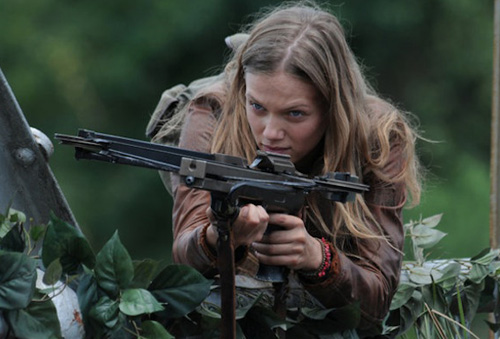 The apocalypse is the high time of bullies and idiots with muscles. Women have no chance to rise to power unless they are extremely clever. This probably explains the lack of strong female characters in Jericho and Revolution. Jericho basically has two somewhat more-than-average women: Gale, the mayor’s wife and Mimi, and IRS agent who got stuck in Jericho. Mimi outsmarts the corporation in season two, but almost dies for it. Gale has some highlights in season one, but is really just a lame excuse for “oh, we need some women”. Revolution does this slightly better, but not much. At the center is usually Charlie, but she seems completely out of place, especially in the later part of the season. She constantly tries to be tough and strong, but she just doesn’t succeed. Maybe the actress is just not good enough. Her tougher counterpart is Nora, a rebel and expert with bombs. She kicks some ass, but ultimately dies. Rachel, Charlie’s mom, has more guts than Charlie, but also suffers from the previously mentioned weird decision-making. The president of the Georgia Federation is a woman, but not a very memorable one. I don’t remember anything interesting about her. As we can see, women appear to have no place in chaotic societies. The dictators and their armies are all men.
The apocalypse is the high time of bullies and idiots with muscles. Women have no chance to rise to power unless they are extremely clever. This probably explains the lack of strong female characters in Jericho and Revolution. Jericho basically has two somewhat more-than-average women: Gale, the mayor’s wife and Mimi, and IRS agent who got stuck in Jericho. Mimi outsmarts the corporation in season two, but almost dies for it. Gale has some highlights in season one, but is really just a lame excuse for “oh, we need some women”. Revolution does this slightly better, but not much. At the center is usually Charlie, but she seems completely out of place, especially in the later part of the season. She constantly tries to be tough and strong, but she just doesn’t succeed. Maybe the actress is just not good enough. Her tougher counterpart is Nora, a rebel and expert with bombs. She kicks some ass, but ultimately dies. Rachel, Charlie’s mom, has more guts than Charlie, but also suffers from the previously mentioned weird decision-making. The president of the Georgia Federation is a woman, but not a very memorable one. I don’t remember anything interesting about her. As we can see, women appear to have no place in chaotic societies. The dictators and their armies are all men.
The apocalypse always contains a new beginning. We have witnessed this in the much too short season two of Jericho, and we will probably witness it in season two of Revolution. Despite Revolution portraying the events 15 years after the apocalypse, the new new beginning involves the re-establishment of modern society. Medieval circumstances are lifted, as the power is back on. But similar to Jericho, the hidden agenda of one man will cause a lot of trouble: in the final minutes of the season finale, the two big capitals of the Monroe Republic and the Georgia Federation appear to have been wiped out. The perpetrator hits the red button with the words “when you burn down the old, new things grow” and we see the former president of the US hiding out in Guantanamo bay, ready to take back the country. This will be an interesting turn, but it could also be a problem: in apocalyptic fiction, new beginnings can be so drastic that they alienate viewers. My thoughts on the problems in Jericho‘s season two should illustrate this.
The cancellation of Jericho is a very sad thing. Though the show has gained a very big fandom, it didn’t succeed in ratings. I suspect this might have something to do with the narrative. Jericho is highly serialized, which makes waiting for the next episode for an entire week annoying. Like many other shows, it works better if you have the possibility of binge watching. I would have enjoyed a more in-depth season two, and definitely one with the last three episodes in higher quality. The sad demise of the show reminded me of the fact that TV is a problematic format to properly tell stories: it is always depended on ratings. Books are the superior format, as they have no limits, no budget and no ratings. Margaret Atwood’s The Handmaid’s Tale, Richard Matheson’s I Am Legend and of course George Orwell’s 1984 are not without reason such milestones of the genre.
The government is corrupt, the US is corrupt
The political system in the US is a terrible one. It is antediluvian and inefficient, which becomes obvious if you just look at the news. Perhaps that’s where the wish of overthrowing it, which so many authors seem to have, comes from. An excellent example is gun control – of which there is none in the US. This is of course of advantage to the storytellers, because what would the apocalypse be without guns? Guns are omnipresent in all apocalyptic fiction – Jericho and The Walking Dead display a vast amount of guns. In Revolution, guns are actually forbidden for the general public, but the militia has plenty of them. The lack of guns can be substituted by other weapons, such as bows and crossbows. I think it would be interesting to see a case of apocalyptic fiction such as Jericho or Revolution that does not take place in the US, because without such a vast amount of guns, people would have to be more creative.
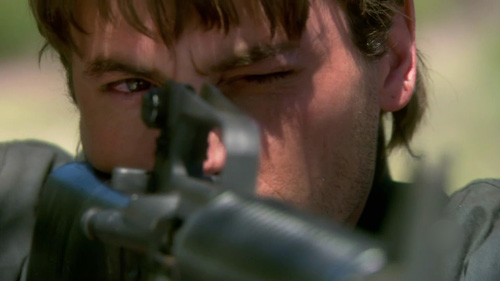 Guns are not the only thing that is corrupt in the US: people are, too. Ultimately it’s people who are the cause of guns. But in the case of Jericho, the apocalypse was caused by Americans themselves, not by others. Religious and other patriotic fanatics want to cleanse the US of its corruption by eliminating millions of people, and with them any kind of social structure. It was an attack from the inside, not one from the multitude of countries the US is constantly at war with. Despite this, the attacks of Jericho were covered up by annihilating North Korea and Iran, making them scapegoats. Jericho has an air of being very critical towards the government. In the final minutes of the show, the new mayor of Jericho flies a “Don’t tread on me” flag, a flag sometimes used to show disagreement with the government (though I’m still trying to figure out just how patriotic that flag is). Naturally, they are addressing the corrupt government/corporation of Cheyenne, but if Jericho were a truly patriotic show, it would fly a proper US flag, wouldn’t it?!
Guns are not the only thing that is corrupt in the US: people are, too. Ultimately it’s people who are the cause of guns. But in the case of Jericho, the apocalypse was caused by Americans themselves, not by others. Religious and other patriotic fanatics want to cleanse the US of its corruption by eliminating millions of people, and with them any kind of social structure. It was an attack from the inside, not one from the multitude of countries the US is constantly at war with. Despite this, the attacks of Jericho were covered up by annihilating North Korea and Iran, making them scapegoats. Jericho has an air of being very critical towards the government. In the final minutes of the show, the new mayor of Jericho flies a “Don’t tread on me” flag, a flag sometimes used to show disagreement with the government (though I’m still trying to figure out just how patriotic that flag is). Naturally, they are addressing the corrupt government/corporation of Cheyenne, but if Jericho were a truly patriotic show, it would fly a proper US flag, wouldn’t it?!
Revolution, on the other hand, is its patriotic counterpart. Here, the rebels fight for the reestablishment of the United States of America, the stars and stripes are a prominent symbol of this – even as inked into the skin of some characters. Unlike Jericho‘s continuous criticism of authorities, my prediction of Revolution‘s season two is the journey from a dystopia back towards the utopia of the US. We’ll see how realistic that’ll turn out. But if you want to examine dystopian circumstances in governments, you don’t have to look far: several countries of our world have fierce dictatorships which are as terrible or maybe even worse than what literature and entertainment have to offer.
Terror, horror and revulsion: The degree of purity
Stephen King as established an interesting theory in his non-fiction book Danse Macabre: he proposes that in horror fiction, the purest emotion is terror. Terror can be achieved merely with psychological phenomena (such as the tell-tale heart of Poe’s short story). Even though there is actually nothing there, you are creeped out and terrified. King always aims for terror in his works, however, if that fails, he brings a monster into the equation. This is the level of horror: horror always involves a monster which menaces the protagonist of a story. If even that fails, King resorts to revulsion: Revulsion is always successful, because everyone is disgusted at the sight of guts, blood and rotting flesh. Stories that involve terror are pure and most successful, whereas revulsion needs devices to achieve its purpose.
I think this theory can be applied to apocalyptic fiction as well, and coincides with my opinion of several works. My lack of enthusiasm for The Walking Dead might be explained in the series’s need to use revulsion. ‘In order to make sure we are successful, lets throw around with guts and gore!’ – I’m not really fond of that, neither am I of zombies. They’re fugly.
Monsters are present in both Falling Skies and I Am Legend, which would puts those two on the level of horror. I can’t seem to find anything interesting about Falling Skies, but I Am Legend is a brilliant example of a successful work. It also involves a vast amount of psychology, which brings it much closer to the level of terror.
Lastly, both Revolution and Jericho are pure – they live off the terror in the minds of people, and are in my opinion the most successful cases of the genre. Though I would not describe Revolution as a good show, it is definitely interesting to study. Jericho, on the other hand, is brilliant in all aspects. It dives into the psychological abyss of survivors and resurfaces with even greater challenges. It has my highest recommendation. But if you would prefer not to be exposed to the disadvantages of the medium of TV shows, I would urge you to read The Handmaid’s Tale – which will probably be reviewed in a blog post of its own soon.


When it comes to post-apocalyptic fiction I also prefer stories without monsters. I like zombie movies but more for the post-apocalypse setting than anything else. I always prefer the setting without zombies though, which of course means I’m a huge fan of Jericho. I also like the British TV-series Survivors, which also explores a post-apocalyptic world, due to a virus, without any monsters whatsoever. Have you watched that one?
I don’t know why Americans create so much post-apocalyptic fiction but my theory is that it’s because never before have we been so close to a possible end. A few hundred years ago mankind couldn’t really end the world. People died, sometimes a lot of them, but the world remained. Nowadays there’s just so many ways the world as we know it could come to an end. So many ways we could end it ourselves. Nuclear war, a man made virus, destroying the environment to the point where earth becomes nearly inhabitable. Living in a world so close to falling over the edge it’s natural to wonder what would happen if we actually DID fall over that edge.